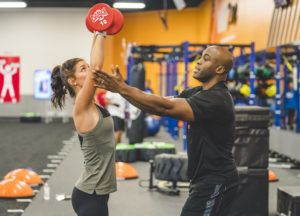By mid-April, top Crunch Fitness franchisee Geoff Dyer was, like millions of other people nationwide, pining for gym life. He could picture it: The walk through the Crunch Fitness doorway, into a room with the latest updated equipment, Tampa Bay members working out alongside each other. A community of sweat and support with no coronavirus in sight.
“The gym is the place to go and get your head right,” says Dyer. “Fitness is such a great business to be involved in today.”
Even in the time of pandemic? Yes, he believes; even then.

After a stellar 2019, Dyer and North Castle Partners, who hold an equity stake in his company, CR Fitness Holdings, are poised for exponential growth. His 21st club, located in Casselberry, opened in March; nine additional Florida locations are slated for ribbon cuttings by the end of the summer. Construction is already underway and he and his investors are very bullish (his words). The fitness sector will rebound—basketball pun intended.
“I think we are all learning through this isolation that we love being around people,” he says. “Crunch Fitness provides that sense of community.”
Before COVID-19 kept Crunch devotees from their favorite HIIT Zone classes and weight routines, Dyer looked ahead to success as usual. This isn’t his first fitness rodeo, after all. He began his career as a fitness instructor and went on to become a manager; later, he founded Lifestyle Family Fitness. The iconic gym brand once boasted 55 fitness centers. Lifestyle Family Fitness was sold to L.A. Fitness in 2012.
Fast-forward to 2020, to the Dyer Crunch Fitness era, when closing the Crunch gyms was not part of the plan. Still, Dyer believes the brand has adjusted well to retain, and attract, members as it strives to deal with COVID-19 fitness fallout. A survey of active members was conducted when the crisis began, and before the stay-at-home orders became official, 1,200 respondents called for meticulous cleaning protocols and a “bring your own towel” mandate. As the locations reopen, Dyer says, his clubs will be meticulous. It’s this type of focus that attracted him to the brand in the first place.
“Crunch Fitness is very innovative in its group fitness,” he says. “All classes are 30 minutes long, and most memberships are month-to-month.”
The brand emerged in the late 1990s and has always presented its own proprietary program. Now, the company positioned as “the no-judgment gym” that combines fitness with serious entertainment is shifting in order to keep members engaged. To bring a sense of normalcy to its exercisers, and combat membership churn, Crunch has gone where COVID-19 can’t attack: online. Crunchlive.com offers a free 90-day trial for anyone; member access is always free.
 More than 100 group classes, and customizable workout plans, abound on the site. Kickboxing, yoga, boot camp and more are highlighted and available 24 hours a day. On Facebook, recognizable personal trainers from local gyms welcome their regulars to work out, bringing a sense of normalcy to social isolation.
More than 100 group classes, and customizable workout plans, abound on the site. Kickboxing, yoga, boot camp and more are highlighted and available 24 hours a day. On Facebook, recognizable personal trainers from local gyms welcome their regulars to work out, bringing a sense of normalcy to social isolation.
“Live classes are so much better, but this is at least something we can do in the meantime,” Dyer says.
Before the world was told, in no uncertain terms, to “stay home,” Crunch showcased its ability to market to virtually anyone with a resting heart rate, including millennials, seniors and businesses. The club’s own perks program offers members discounts at local businesses; locations also participate in Peerfit, a corporate wellness platform. Dyer sees this trend continuing.
“Businesses are incentivizing employees, more and more, to join wellness programs, to join gyms,” Dyer says. “Approximately one of every three Americans is obese and exercise can lower a person’s risk of many health problems.”
He points to conditions that could make a person more vulnerable to the effects of COVID-19 as an example of the importance of fitness. Those stricken with the coronavirus who suffer from diabetes or obesity are at an increased risk of complications, he says. Health, wellness and fitness, in particular, increases wellbeing and decreases mortality.
 Beyond COVID-19, Dyer foresees a healthy future filled with acquisitions and opportunity—and a population of dedicated Crunch Fitness enthusiasts who return to their beloved gym in droves. Membership offers the ability for members to work out at any of the brand’s 312 locations (as of press time); a base option exists for single club access. The Crunch, high-value, low-price model is in stark contrast to higher-priced fitness options. Dyer sees the promise of the Crunch model and he’s excited to see what the future holds.
Beyond COVID-19, Dyer foresees a healthy future filled with acquisitions and opportunity—and a population of dedicated Crunch Fitness enthusiasts who return to their beloved gym in droves. Membership offers the ability for members to work out at any of the brand’s 312 locations (as of press time); a base option exists for single club access. The Crunch, high-value, low-price model is in stark contrast to higher-priced fitness options. Dyer sees the promise of the Crunch model and he’s excited to see what the future holds.
“Our growth has been really aggressive,” he says. “The ultimate goal is to open 100 Crunch Fitness locations by the end of 2023.”
For now, opening those gym doors at all is a major victory.
“We’ve all learned that we love being around people,” Dyer says. “I think this will be a much better world when all this is over.”

Great article.
Hi there! This post couldn’t be written any better! Reading through this post
reminds me of my good old room mate! He always kept chatting about this.
I will forward this post to him. Pretty sure he will
have a good read. Many thanks for sharing!
Keep workjng ,terrific job!